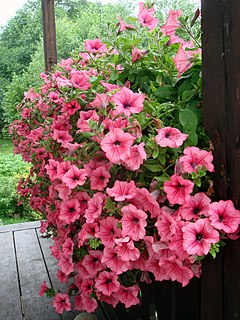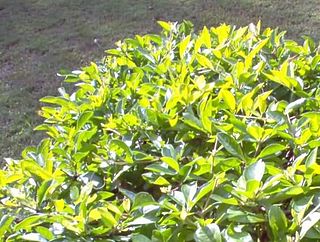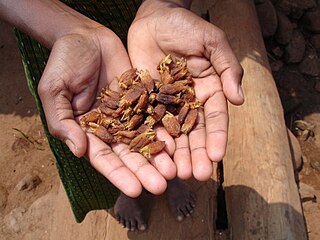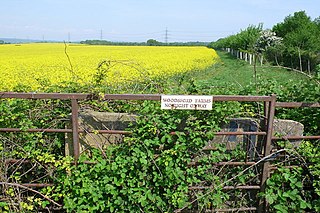
Gardening is the practice of growing and cultivating plants as part of horticulture. In gardens, ornamental plants are often grown for their flowers, foliage, or overall appearance; useful plants, such as root vegetables, leaf vegetables, fruits, and herbs, are grown for consumption, for use as dyes, or for medicinal or cosmetic use. Gardening is considered by many people to be a relaxing activity. There are also many studies about the positive effects on mental and physical health in relation to gardening.

The Wildlife and Countryside Act 1981 is an Act of Parliament in the United Kingdom implemented to comply with European Council Directive 2009/147/EC on the conservation of wild birds. In short, the act gives protection to native species, controls the release of non-native species, enhances the protection of Sites of Special Scientific Interest and builds upon the rights of way rules in the National Parks and Access to the Countryside Act 1949. The Act is split into 4 parts covering 74 sections; it also includes 17 schedules.

Ornamental plants are plants that are grown for decorative purposes in gardens and landscape design projects, as houseplants, cut flowers and specimen display. The cultivation of ornamental plants is called floriculture, which forms a major branch of horticulture.

Mushroom hunting, mushrooming, mushroom picking, mushroom foraging, and similar terms describe the activity of gathering mushrooms in the wild, typically for food. This practice is popular throughout most of Europe, Australia, Japan, Korea, parts of the Middle East, and the Indian subcontinent, as well as the temperate regions of Canada and the United States.

The freedom to roam, or "everyman's right", is the general public's right to access certain public or privately owned land, lakes, and rivers for recreation and exercise. The right is sometimes called the right of public access to the wilderness or the "right to roam".

Pruning is a horticultural and silvicultural practice involving the selective removal of certain parts of a plant, such as branches, buds, or roots.
Usufruct is a limited real right found in civil-law and mixed jurisdictions that unites the two property interests of usus and fructus:
Plant breeders' rights (PBR), also known as plant variety rights (PVR), are rights granted to the breeder of a new variety of plant that give the breeder exclusive control over the propagating material and harvested material of a new variety for a number of years.

Prunus cerasifera is a species of plum known by the common names cherry plum and myrobalan plum. It is native to Southeast Europe and Western Asia, and is naturalised in the British Isles and scattered locations in North America. Also naturalized in parts of SE Australia where it is considered to be a mildly invasive weed of bushland near urban centers.

In common law jurisdictions, an implied warranty is a contract law term for certain assurances that are presumed to be made in the sale of products or real property, due to the circumstances of the sale. These assurances are characterized as warranties irrespective of whether the seller has expressly promised them orally or in writing. They include an implied warranty of fitness for a particular purpose, an implied warranty of merchantability for products, implied warranty of workmanlike quality for services, and an implied warranty of habitability for a home.

Santalum acuminatum, the desert quandong, is a hemiparasitic plant in the sandalwood family, Santalaceae, which is widely dispersed throughout the central deserts and southern areas of Australia. The species, especially its edible fruit, is also commonly referred to as quandong or native peach. The use of the fruit as an exotic flavouring, one of the best known bush tucker, has led to the attempted domestication of the species.

Podophyllum is an herbaceous perennial plant in the family Berberidaceae, described as a genus by Linnaeus in 1753. In the past, several species were included in the genus, but all but one have been transferred to other genera (Dysosma and Sinopodophyllum). The one remaining species is Podophyllum peltatum, with common names mayapple, American mandrake, wild mandrake, and ground lemon. It is widespread across most of the eastern United States and southeastern Canada.
Wildcrafting is the practice of harvesting plants from their natural, or 'wild' habitat, primarily for food or medicinal purposes. It applies to uncultivated plants wherever they may be found, and is not necessarily limited to wilderness areas. Ethical considerations are often involved, such as protecting endangered species, potential for depletion of commonly held resources, and in the context of private property, preventing theft of valuable plants, for example, ginseng.

Non-timber forest products (NTFPs), also known as non-wood forest products (NWFPs),wild forest products, minor forest produce, special, minor, alternative and secondary forest products, are useful foods, substances, materials and/or commodities obtained from forests other than timber harvested on a gradient from wild to farmed. They typically include game animals, fur-bearers, nuts, seeds, berries, mushrooms, oils, sap, foliage, pollarding, medicinal plants, peat, mast, fuelwood, fish, insects, spices, and forage.

A noxious weed, harmful weed or injurious weed is a weed that has been designated by an agricultural or other governing authority as a plant that is injurious to agricultural or horticultural crops, natural habitats or ecosystems, or humans or livestock. They may also be termed invasive plants. Most noxious weeds have been introduced into an ecosystem by ignorance, mismanagement, or accident. Some noxious weeds are native. Typically they are plants that grow aggressively, multiply quickly without natural controls, and display adverse effects through contact or ingestion. Noxious weeds are a large problem in many parts of the world, greatly affecting areas of agriculture, forest management, nature reserves, parks and other open space.

Right of way is "the legal right, established by usage or grant, to pass along a specific route through grounds or property belonging to another", or "a path or thoroughfare subject to such a right". A similar right of access also exists on land held by a government, lands that are typically called public land, state land, or Crown land. When one person owns a piece of land that is bordered on all sides by lands owned by others, an easement may exist, or be created so as to initiate a right of way through the bordering land.
In Canada, the term quasi-constitutional is used for laws which remain paramount even when subsequent statutes, which contradict them, are enacted by the same legislature. This is the reverse of the normal practice, under which newer laws trump any contradictory provisions in any older statute.
The prohibition on orlah-fruit is a command found in the Bible not to eat fruit produced by a tree during the first three years after planting. The Hebrew word orlah literally means "uncircumcised". This meaning is often footnoted in English translations:
Leviticus 19:23 "When you enter the land and plant any kind of fruit tree, regard its fruit as forbidden.[a] For three years you are to consider it forbidden [b]; it must not be eaten. 24 In the fourth year all its fruit will be holy, an offering of praise to the LORD. 25 But in the fifth year you may eat its fruit. In this way your harvest will be increased. I am the LORD your God."
The South African law of lease is an area of the legal system in South Africa which describes the rules applicable to a contract of lease. This is broadly defined as a synallagmatic contract between two parties, the lessor and the lessee, in terms of which one, the lessor, binds himself to give the other, the lessee, the temporary use and enjoyment of a thing, in whole or in part, or of his services or those of another person; the lessee, meanwhile, binds himself to pay a sum of money as compensation, or rent, for that use and enjoyment. The law of lease is often discussed as a counterpart to the law of sale.
The Scottish Outdoor Access Code provides detailed guidance on the exercise of the ancient tradition of universal access to land in Scotland, which was formally codified by the Land Reform (Scotland) Act 2003. Under Scots law everyone has the right to be on most land and inland water for recreation, education and going from place to place providing they act responsibly. The basis of access rights in Scotland is one of shared responsibilities, in that those exercising such rights have to act responsibly, whilst landowners and managers have a reciprocal responsibility to respect the interests of those who exercise their rights. The code provides detailed guidance on these responsibilities.












